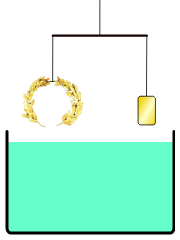Eureka effect
The Eureka or Aha! effect refers to the moment of insight when a puzzling problem is suddenly solved. It is named after the Greek polymath Archimedes.

Archimedes was asked by the local king to detect whether a crown was pure gold, or if the goldsmith had added silver. During his trip to the public bath, he noticed how water got displaced when his body sank into the bath. The volume of water displaced equals the volume of the body immersed in the water. He suddenly realized that two objects which weighed the same in air might not weigh the same in water, because the less dense object would displace less water. This is known as Archimedes' principle.
Archimedes leaped out of a public bath, and ran home naked shouting Eureka! (I found it). This story is thought by some to be a myth, but Archimedes was indeed a most notable inventor. He would certainly have experienced the Aha! effect.
There is some research on the Aha! insight. Aha! moments cannot be predicted. Insight is a psychological term describes the process in problem solving when a previously unsolvable puzzle becomes suddenly clear and obvious. Often this transition from not understanding to sudden comprehension is accompanied by an exclamation of joy or satisfaction, an Aha! moment. A person using insight to solve a problem is able to give accurate, clear, all-or-nothing type responses, whereas individuals not using the insight process are more likely to produce partial, incomplete responses.[1]
There seems to be a two phase process. In the first phase, the problem solver gets stuck. Even though they may have explored all the possibilities, they still cannot see the solution. The second phase occurs suddenly and unexpectedly. After a break in mental fixation or re-evaluating the problem, the answer is seen.[2] Insight problems may be difficult to solve because of our mental fixation on the inappropriate aspects of the problem.[3] People have a good memory for Aha! moments. Insight may occur after a break in mental fixation, allowing the solution to appear transparent and obvious.
Eureka Effect Media
A 16th century woodcut of Archimedes' eureka moment
Example of a puzzle that requires an insight from the solver. Asked what goes in the blank square, and told that it is not the number six, the solver must realise that the image represents a gear stick and the answer is "R" for "Reverse".
References
- ↑ Kounios et al 2008. The origins of insight in resting-state brain activity. Neuropsychologia 46, 281–291.
- ↑ Qui & Zhang 2008. Aha! Effects in a guessing Chinese logograph task: an event-related potential study. Chinese Science Bulletin 53 (3), 384–391.
- ↑ Mai, Luo et al 2004. Aha! effects in a guessing riddle task: an event-related potential study. Human Brain Mapping 22, 261–270.



